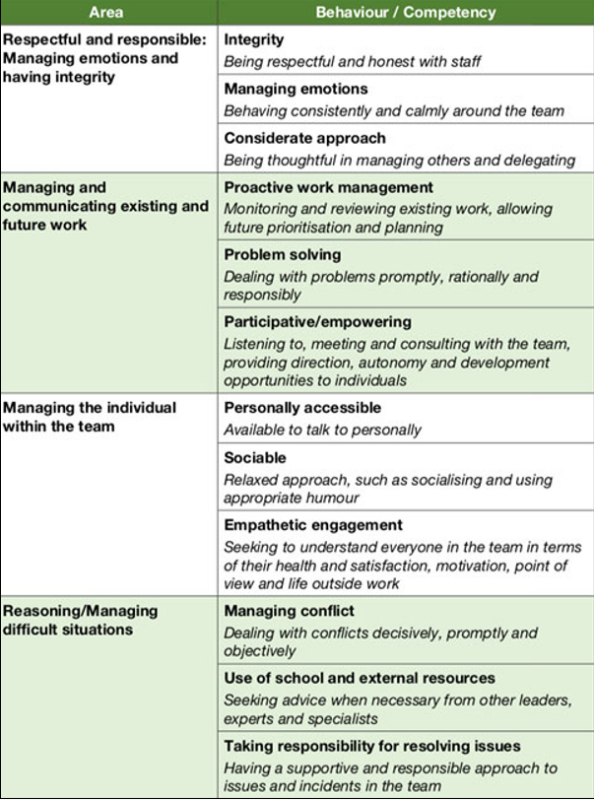Developing leadership competencies that promote a positive culture

How well does your college or school culture positively promote the wellbeing of all staff, faculty and students? Is your leadership team aware of the impact their behaviours have on those around them?
The academic year has begun, time to plan ahead and welcome new and returning staff and students. It’s also an opportune time to think about how you and your leadership team can help support the wellbeing of everyone in the community, starting with staff.
Carving out time to focus on building the right culture, is an ever-present challenge for leaders constantly racing against the clock to deal with the daily demands of their job. However, those able to do this well, reap long-term benefits, with a far more productive, effective and happy workforce.
References to wellbeing are usually evident in the vision and values, yet are they an integral part of everyday life? Can everyone articulate what is expected and clearly demonstrate they are being ‘lived’? Behaviours play such a crucial part in your culture, so those proven to have the greatest impact should be regularly talked about and shared.
‘Culture eats strategy for breakfast’ Peter Drucker
Many will recognise this famous quote from the renowned management consultant and writer, Peter Drucker. He’s not suggesting strategy and planning are not important – they are – but a poor strategy delivered within the right culture, will always do better, than a brilliant strategy in a poor one.
The first place to check to ensure your culture has wellbeing built in is the behaviours of the leaders, and how they engage with staff. When they model the right behaviours, they create a trickle-down effect, teachers and staff will adopt those behaviours with their students, and in turn, students with their peers.
Becoming people experts
Time and capacity are obstacles, not just for those leading the college or school, but for all line managers, particularly when first appointed. Many go from being a teacher one day, to year group or department head the next, continuing with much of their previous role, juggling teaching with leadership responsibilities. Often, they receive little leadership training or professional development that focuses on ‘soft’ or ‘people skills’. They are undoubtably experts in their subject or specialism and can coordinate and plan activities. Yet as leaders they now need the time and opportunity to develop as people experts. The same is true for those progressing in support staff and any other roles.
So why is becoming a people expert so important?
Consciously and unconsciously, we make continuous judgements about the everyday interactions we face, including our experiences in the workplace. There are situations that have a big impact on how people feel and perform, and leaders can think about these as moments of truth – it is those that tend to have more of a direct impact on the way staff members feel and their wellbeing.
‘Moments of truth’ for leaders and their staff include:
- The recruitment and onboarding experience – do leaders effectively welcome new staff members and create a sense of belonging?
- How often and appropriately do leaders greet staff members at the start and end of the day, and how regularly do they check-in with them.
- Do leaders manage by walking around and provide appropriate face to face recognition, and do staff members understand why it is given? This is in addition to any more formal recognition given through staff meetings, cards or shout-outs.
- How well do leaders distribute and help staff members manage their workload and take an interest in their work/life balance?
- Are leaders effectively involving staff members in decisions or changes that affect them?
- Do leaders take the time to effectively listen and provide genuine opportunities to receive feedback?
There are multiple examples of these kinds of interactions that happen throughout a normal working day – being a people expert is about ensuring responses and approaches are considered.
Do leaders have the emotional intelligence, empathy and the skills to hold a difficult conversation – and most importantly, do they recognise whether they do or not? Without the right level of development and support, a high self-awareness and the time for self-reflection, many leaders simply do not realise the impact they have on their team.
Management competencies for preventing and reducing stress at work
Extensive research from Goldsmiths, University of London, ‘Management competencies for preventing and reducing stress at work’, funded by the Chartered Institute of Personnel and Development (CIPD), Investors in People, and the Health and Safety Executive (HSE), identified twelve competencies and associated behaviours, set across four areas that prevent or reduce stress in those they lead.

Refined management competencies for preventing and reducing stress at work.
The research provides food for thought, and helping leaders to self-assess against these competencies is a good first step. Following up to support leaders to then choose to adapt and change behaviour, where needed, is a much more difficult task. People often have deep and long-held beliefs, and to change, they have to understand why they should. Once they have recognised there’s a need, they can then begin an ongoing process involving regular and deliberate reflection and practice to develop improved habits.
The statements below are just a few examples of breaking down some of the competencies into actions which will serve as prompts for self-reflection:
I am someone who:
- Does what I say I will.
- Gives more positive than negative feedback.
- Never talks about team members behind their back.
- Allows my team flexibility in how they choose to work.
- Recognises feedback as helping towards positive change, rather than as a challenge or criticism.
- Asks for help when needed.help your leaders raise awareness of behaviours and opportunities to build staff wellbeing
Helping your leaders raise awareness of behaviours and opportunities to build staff wellbeing
If you want to help your leaders raise awareness of behaviours and opportunities to build staff wellbeing into your culture, here are three key actions you might consider taking as a team.
- Review your college or school values and identify key behaviours that underpin them – those you hope to see every day to indicate those values are ‘lived’. Ask leaders to practise using these behaviours and create a safe space to review success – it is OK not to get them right – what is important is the discussion and learning, that will build better leadership habits.
- Schedule time during leadership meetings for individual reviews of interactions leaders believed were key ‘moments of truth’, and assess how well they were approached.
- ‘Manage by walking around’ – create time (even just 30 minutes a day) to walk about and catch people doing things right – praise in the moment to reinforce those behaviours you want to see.
Benefits of developing the right leadership
Successful senior leaders are great role models, they encourage and coach middle leaders and all staff to adopt similar behaviours. Without investing time in the process and making these behaviours an explicit focus with the right support in place, nothing is likely to change.
Developing the right leadership behaviours across your organisation is the only way to build a culture that will directly improve staff experience and improve retention.
Staff and faculty who feel supported and believe their leaders and line managers have their best interests at heart, are naturally more motivated, committed and effective, which in turn improves student wellbeing and outcomes.
For further information, support and advice about developing effective leadership competencies, please contact welbee.co.uk.
By Mark Solomons, Author, Founder and CEO of Welbee, supporting school and college leaders to transform culture, and improve staff wellbeing and performance.
FE News on the go…
Welcome to FE News on the go, the podcast that delivers exclusive articles from the world of further education straight to your ears.
We are experimenting with Artificial Intelligence to make our exclusive articles even more accessible while also automating the process for our team of project managers.
In each episode, our thought leaders and sector influencers will delve into the most pressing issues facing the FE sector, offering their insights and analysis on the latest news, trends, and developments.











Responses